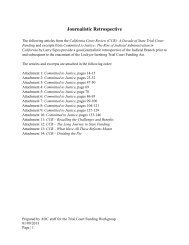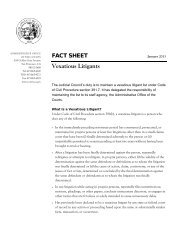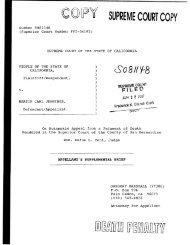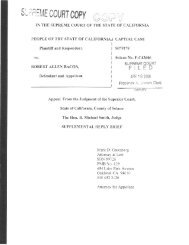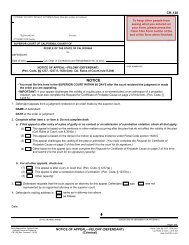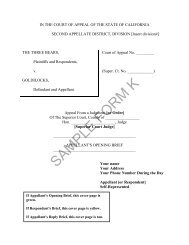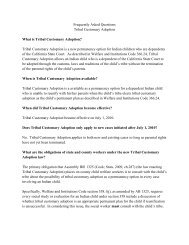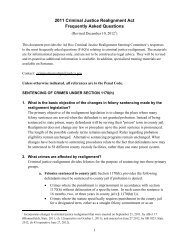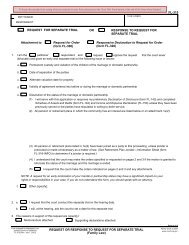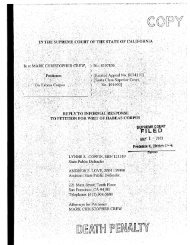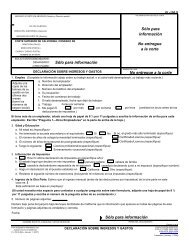Appellant, William Satele, Reply Brief - California Courts - State of ...
Appellant, William Satele, Reply Brief - California Courts - State of ...
Appellant, William Satele, Reply Brief - California Courts - State of ...
You also want an ePaper? Increase the reach of your titles
YUMPU automatically turns print PDFs into web optimized ePapers that Google loves.
the facts indicate that only one defendant acted in that role.<br />
It is the possibility <strong>of</strong> inconsistent factual theories that was the evil in In re<br />
Sakarias (2005) 35 Ca1.4th 140, and the argument appellant has presented is that<br />
the findings that both defendants personally fired the weapon violates the<br />
principles discussed in Sakarias. However, in spite <strong>of</strong> the fact that this is the<br />
essence <strong>of</strong> claim asserted here, respondent does not address Sakarias at all in<br />
discussing this issue. (Respondent only discusses Sakarias in a subsequent section<br />
<strong>of</strong> Respondent's <strong>Brief</strong> dealing with the issue <strong>of</strong> prosecutorial misconduct. (See<br />
RB at pp.142-145.) However, the Sakarias analysis is critical to an understanding<br />
<strong>of</strong>this issue.<br />
Sakarias held it was contrary to principles <strong>of</strong> fundamental fairness for the<br />
prosecution to attribute to two defendants, in separate trials, a criminal act only<br />
one defendant could have committed. (Sakarias, supra, 35 Ca1.4th at pp. 155-156,<br />
italics added in RB at pp. 142-143.) <strong>Appellant</strong>'s point is that ifonly one defendant<br />
could have committed the act in question the fundamental unfairness <strong>of</strong>attributing<br />
that act to two defendants is the same whether the prosecution does so in one trial<br />
or two. While Sakarias discussed the result in the context <strong>of</strong>two trials, there is no<br />
reason in law or policy to limit the principles underlying Sakarias to a two-trial<br />
situation.<br />
Sakarias is based on the premise that the prosecutor's use <strong>of</strong> inconsistent<br />
factual theories "surely does not inspire public confidence in our criminal justice<br />
system." (Id. at p. 159, quoting Thompson v. Calderon (9th Cir. 1997) 120 F.3d<br />
1045, 1072 (dis. opn. <strong>of</strong> Kozinski, J).) <strong>Appellant</strong> submits that the foregoing<br />
rationale applies with equal force whether the two inconsistent results are obtained<br />
in two trials or in one trial as a result <strong>of</strong>a poorly worded verdict form.<br />
For the foregoing reasons, respondent's contentions are premised on<br />
misunderstanding <strong>of</strong>the issue and, accordingly, are flawed.<br />
4



